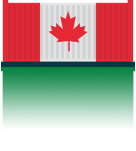Have commercial or industrial goods you need to import to Canada from the USA? Read our tips to avoid having your shipment halted and mired in bureaucratic red tape at the border
Shipping goods from the U.S. to Canada ought to be a straightforward matter, and for the most part, it is. However, if you hope to avoid raising the ire (and suspicions) of Canadian customs officials, you need to ensure your shipment complies with the Canada Border Services Agency’s (CBSA) and Canada Revenue Agency’s (CRA) regulations.
Since the Canada-U.S. free-trade agreement came into being in 1989, and the North American free-trade agreement in 1994, two-way trade between both countries hit an estimated $2.4 billion on a daily basis in 2014.
While both agreements have increased cross-border trade and eliminated tariffs or duties on most goods produced domestically on this continent, there are several taxes and fees imposed on shipments entering Canada. Furthermore, there is a significant amount of paperwork related to importing goods that you must provide to the CBSA in advance of any shipments arriving at the border. With this in mind, you may wish to consider hiring a licensed customs broker to prepare and provide the CBSA with the required documentation, and ensure any applicable fees on your imports get paid on your behalf.
Before Shipping Goods to Canada
There are five important border clearance factors to keep in mind when you’re shipping goods to Canada from the U.S.:
- Obtain a business number. For commercial importers or businesses, you require a business number in advance of shipping any goods. Business numbers are issued by the CRA for what’s called an import/export account. The account is free of charge.
- Origin of goods you’re importing. You must identify and provide proof of the country in which the goods you want to ship to Canada originate. For instance, if the product in question was shipped to you in the U.S. from the United Kingdom, then the country of origin for that product is, in fact, the U.K.
- Ensure the goods you want to import are permitted into Canada. Not all products or goods are allowable in Canada. For example, prohibited products include mattresses, white phosphorous matches, live animals, perishable goods, and second-hand automobiles. Check the CBSA’s prohibited importations list before you attempt to ship any product to Canada.
- Taxation. Most goods entering Canada from the U.S. are subject to federal and provincial taxes. Federally, there’s a 5% Goods and Services Tax (GST) applied to anything sold in Canada for domestic consumption. At the provincial level, it varies. Some provinces – Ontario, Nova Scotia, New Brunswick, Prince Edward Island, and Newfoundland and Labrador – impose a Harmonized Sales Tax (HST) which combines the GST with provincial tax rates. British Columbia, Saskatchewan, Manitoba, and Quebec levy a provincial sales tax on top of the GST that ranges between 5% and 10%. All goods imported into Canada must be reported to the CBSA to prevent delays, fines, and shipment seizures.
- Hold on to records of your imports. The CBSA advises you retain records of all the goods you ship into Canada for up to six years in either electronic or paper format. That includes a record of the quantities received, the price paid, the country of origin, vendor, product, and any other relevant information.
Additionally, when shipping your commercial goods into Canada via a third-party agent or carrier, you need to report your shipment to the CBSA in advance through that carrier’s or agent’s Electronic Data Interchange system.
Mitigating Shipping Risks
Ensuring any paperwork required by the CBSA that is related to your shipments is properly and thoroughly prepared is essential. Taking shortcuts will cost you. Paying meticulous attention to detail concerning customs compliance is an absolute necessity, and it sometimes requires the expertise of an experienced logistics consultant and customs broker to avoid making errors.
In short, your customs paperwork must inform the CBSA about:
- What you are shipping and the value of each item
- The reason you are shipping these goods into Canada
- The 10-digit tariff classification number for each item you’re importing and declare the rate of duty for your goods
- The method of shipping. Talk to the transportation company of your choice about cross-border requirements
Do you have questions about importing commercial goods into Canada from the U.S.?
Talk to us. As Canada’s warehousing, distributing, and logistics experts, we can help you get your goods imported in a timely fashion to one of our distribution centres located in Ontario in Mississauga and Brampton, or to our facility on the west coast in Delta, B.C.





